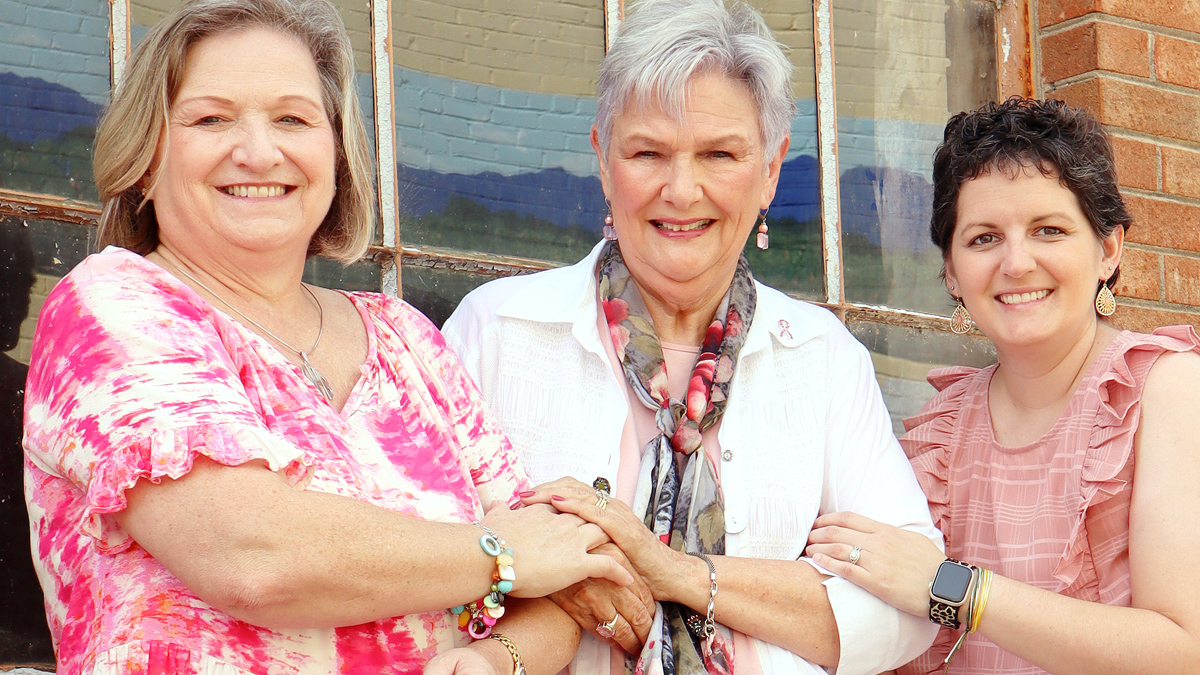There is no single answer to the multitude of questions that come with the news that you have cancer. Each reaction, choice and outcome is as unique as a fingerprint.
When Lynne Pryor, 58, learned that she had stage 1 invasive ductile carcinoma on Dec. 5, 2008. “How am I going to get through this?” “Will it ever come back?” “What would happen to my children?” were the questions that haunted her.
“I was 31 years old with a newborn baby at home,” said Caitlyn Harper, 32, who was diagnosed with stage 2B invasive ductal carcinoma on July 21, 2021.
“After the words ‘you have cancer,’ I wanted to know if I was going to still be around for him – his first birthday, first day of school. Would he ever know his mama?” Harper added. “Then, of course, the why or the how. The why was the biggest question
for me. Why is this happening? Why me?”
Cathy McMillan, age 71, also remembers asking, “What is the purpose – God’s purpose? Why do I have this?”
While their questions and each of their paths to remission differ, there is one resounding truth that McMillan, Harper and Pryor share: The flow of love and support that unfolds throughout a cancer journey is overwhelmingly beautiful.
“People brought food, they came to sit with my kid, someone cut our grass from summer through fall,” said Harper. “They just showed up; this loving army of people showed up.”
“We ate casseroles for years,” echoed McMillan, who first learned that she had a grade 3 tumor in 2006. “And the gorgeous flowers. Knowing people cared for me – some that I didn’t even know cared – was an overwhelming joy.”
“Meals, flowers, gift cards and many personal ‘pick-me-up’ notes,” Pryor said as she inventoried the generosity and love she experienced. “Each Monday evening for over a month, a friend sent us Papa Johns pizza. That was the highlight of my children’s day. They would say, ‘Oh Mom, the delivery man comes tonight!’”
All three women live in the South Carolina Upstate and have known each other, or about each other, for years through church and town events, including Relay for Life. As breast cancer survivors, they recently gathered for a group interview.
They hope that by sharing their journeys and advice, they can help other cancer fighters face their own unique questions, choices and outcomes with less fear and more hope.
What advice would you offer women who are fighting cancer?
“Always be persistent and do not wait for doctors to see you in a couple of months. You know your body and you must be your own advocate. Always hold your head high and “fight like a girl!” – Lynne
“Have faith in your medical team and ask questions. Try to keep active and do as much physical activity as you feel that you can. I had a treadmill and I walked whenever I could and felt like it.” – Cathy
“Keep going. As hard as it is, as sick as you may be, as tired as you may be, keep going. Live your life as if you don’t have cancer, except on treatment days. My oncologist told me that at my very first appointment, and it has stuck with me to this day.” – Caitlyn
Best tip for women dreading hair loss.
“Own it! Yes, it’s an extremely hard transition, and I had plenty of meltdowns over it. The best thing I did was just remind myself that this was just an unfortunate part of the process, and it would grow back.” – Caitlyn
“Take advantage of the Feel Good/Look Good program that the American Cancer Society has. It made me feel so much better about the hair loss. At work, I was bald and my co-workers were very supportive. When I visited a school, I wore cute hats because I didn’t want to scare the little kids. I’ve always loved to wear hats so it was not a hardship.” – Cathy
“Visit your local Cancer Association office and introduce yourself. Tell them what type of cancer you have and see what they have to offer. You can get wigs, bandanas, scarves and beanies. And believe me, with a bald head, you do get cold as you sleep. The beanie came in really handy.” – Lynne
For more advice and a deeper read about each woman’s cancer journey, visit UpstatePhysiciansSC.com/BreastCancer.
By Lisa Breslin
